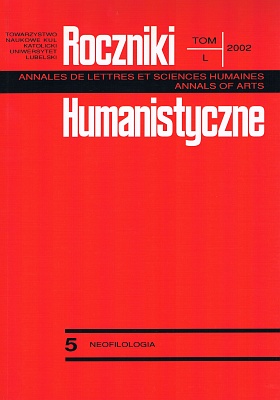The Limits of the Narratee's Interpretive Competence: an Analysis of Direct Address to the Reader in David Malouf's An Imaginary Life and John Fowles's The French Lieutenant's Woman
Abstract
[Abstrakt tylko w j. polskim / Abstract only in Polish]
Granice kompetencji interpretacyjnej odbiorcy narracji. Analiza zwrotów do czytelnika w An Imaginary Life Davida Maloufa i Kochanicy Francuza Johna Fowlesa
Podstawowym składnikiem tożsamości odbiorcy narracji jest kompetencja interpretacyjna zakładana przez narratora. Dwie współczesne powieści anglojęzyczne analizowane w powyższym artykule reprezentują dwa skrajne przypadki kompetencji przypisywanej odbiorcy narracji: jej minimalny oraz maksymalny zakres.
An Imaginary Life jest przykładem tekstu, w którym występuje odbiorca o minimalnej kompetencji interpretacyjnej. Sytuacja komunikacyjna wynikająca z przyjętej konwencji (listu do potomności) powoduje, iż narrator, rzymski poeta Owidiusz, zakłada, że odbiorca jego tekstu, żyjący w rzeczywistości zupełnie innej od rzeczywistości przezeń opisywanej i posługujący się innym niż łacina językiem, z trudem zrozumie jego list. Przykład tej powieści pokazuje, że odbiorca narracji jest fikcyjnym elementem tekstu, składnikiem określonej konwencji, różnym od czytelnika zakładanego przez autora.
Kochanica Francuza jest z kolei przykładem tekstu, w którym narrator przypisuje odbiorcy narracji maksymalną kompetencję. Również w tym przypadku wynika to z przyjętej konwencji literackiej. Powieść Fowlesa jest specyficznym przykładem powieści historycznej, w której narrator nieustannie podkreśla swą dwudziestowieczną perspektywę. W komentarzach adresowanych do czytelnika zakłada on, że odbiorca jego tekstu należy do tej samej co on wspólnoty kulturowej i jest w stanie zauważyć liczne nawiązania do literatury wiktoriańskiej. Celem narratora jest uświadomienie dwudziestowiecznemu czytelnikowi, że jego obraz wiktorian oparty jest na stereotypach zaczerpniętych z literatury oraz przekonaniu o wyższości współczesnej kultury.
References
Bishop, P.: David Malouf and the Language of Exile, in: Australian Literary Studies, 10(1982), pp.419-428.
Bradbury, M.: The Modern British Novel. London: Penguin 1994.
Buckridge, P.: Colonial Strategies in the Writing of David Malouf, in: Kunapipi, 8(1986), pp.48-58.
Bump, J.: The Narrator as Protoreader in The French Lieutenant's Woman, in: The Victorian Newsletter, 74 (1988), pp. 16-18.
Byatt, A.S.: People in Paper Houses: Attitudes to `Realism' and `Experiment' in English Postwar Fiction, in: The Contemporary English Novel, ed. M. Bradbury, D. Palmer, Stradford-upon-Avon Studies 18, London: Edward Arnold, 1979, pp. 19-42.
Chatman, S.: Story and Discourse: Narrative Structure in Fiction and Film, Ithaca: Cornell University Press, 1978.
Culler, J.: Structuralist Poetics, Ithaca, NY: Cornell University Press, 1975.
Fish, S.: Introduction, or How I Stopped Worrying and Learned to Love Interpretation, in: Is There a Text in This Class? The Authority of Interpretive Communities, Cambridge, Mass.: Harvard University Press 1980, pp. 1-20.
Genette, G.: Narrative Discourse. An Essay in Method, trans. J.E. Lewin, Ithaca, NY: Cornell University Press, 1980.
Giddens, A.: Modernity and Self-Identity: Self and Society in the Late Modern Age, Stanford: Stanford University Press, 1991.
Hutcheon, L.: A Poetics of Postmodernism, London and New York: Routledge, 1988.
Kalaga, W., Prower, E.: The Reader as Character, in: Discourse and Character, ed. W. Kalaga, T. Sławek. Katowice: Uniwersytet Śląski, 1990, pp. 31-39.
Kolek, L.S.: Re-Structuring the World: David Malouf's An Imaginary Life, in: The Evidence of Literature. Interrogating Texts in English Studies, ed. S.-J. Spånberg, H. Kardela, G.Porter, Lublin: Maria Curie-Skłodowska University Press, 2000, pp.113-128.
McDonald, A.G.: Beyond Language: David Malouf's An Imaginary Life, in: Ariel, 19(1988), pp.45-54.
Nettlebeck, A.: Imagining the Imaginary in An Imaginary Life, in: Southern Review, 26(1993), pp.28-38.
Phelan, J.: Reading People, Reading Plots: Character, Progression, and the Interpretation of Narrative, Chicago and London: University of Chicago Press, 1989.
Prince, G.: Introduction to the Study of the Narratee, trans. F. Mariner, in: J. E. Tompkins (ed.), Reader-Response Criticism: From Formalism to Post-Structuralism, Baltimore and London: Johns Hopkins University Press, 1980, pp. 7-25.
Rabinowitz, P.J.: Truth in Fiction: A Reexamination of Audiences, in: Critical Inquiry, 4(1977), pp.121-141.
Ricoeur, P.: Time and Narrative, vol. 1-3, trans. K. Blamey, D. Pellaur, Chicago: University of Chicago Press, 1984-1988.
Riffaterre, M.: Describing Poetic Structures: Two Approaches to Baudelaire's “Les Chats”, in: Yale French Studies, 36-37(1966), pp.200-42.
Said, E.: Orientalism, New York: Pantheon Books, 1978.
Stephens, J.: “Beyond the Limits of our [sic] Speech...”: David Malouf's An Imaginary Life, in: Commonwealth Novel in English, 3 (1990), pp.160-168.
Tarbox, K.: The French Lieutenant's Woman and the Evolution of Narrative, in: Twentieth Century Literature, 42 (1996), pp.88-102.
Copyright (c) 2002 Roczniki Humanistyczne

This work is licensed under a Creative Commons Attribution-NonCommercial-NoDerivatives 4.0 International License.





